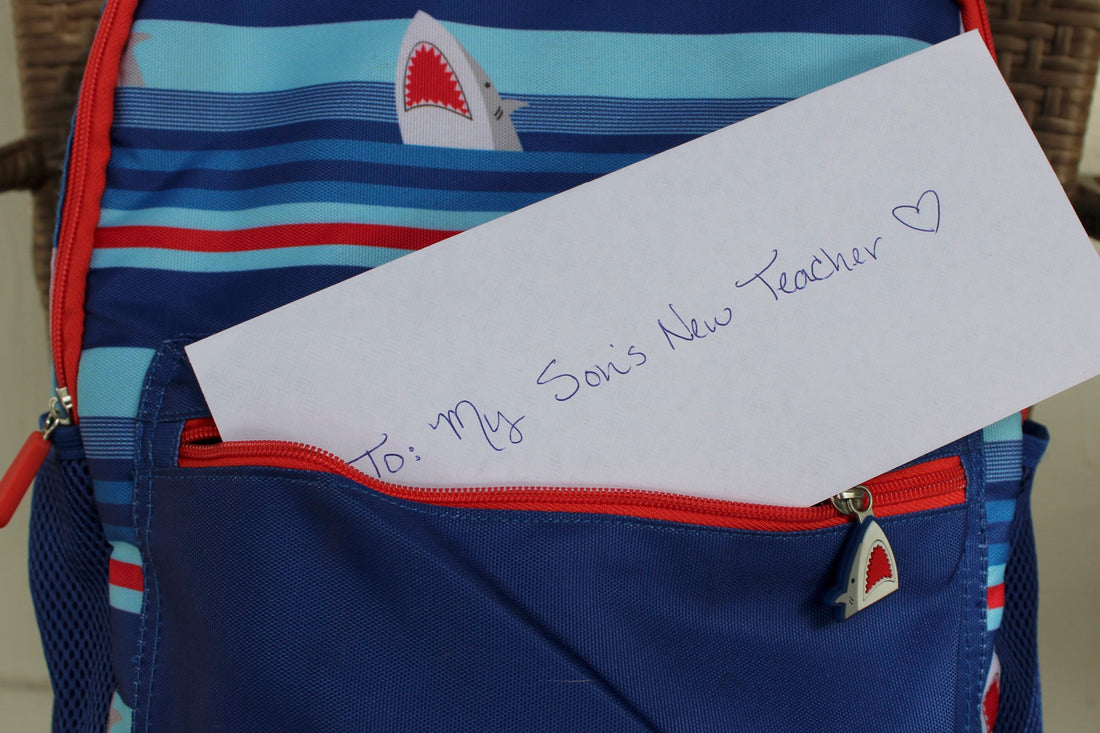
A Back-to-School Letter to My Son's New Teachers

Before adopting our son, I heard countless times,
"Don't share too much of his story."
"You are his gatekeeper. Be careful what you say."
"Remember, it is his story to share."
In my very black-and-white brain, "not sharing his story" equalled "don't tell anything about him." Like nothing. Zip it and throw the key away. The first time I dropped him off in a little preschool class, I awkwardly said something to his teachers like "Please let me know if he misbehaviors so we can talk about it at home." Real informative, right?!
The teacher in me knew that the more I understood about my own students, the better I could usually support them. I didn't need to know all their personal history, but certain behaviors they struggled with, what the parents did at home, what worked well with previous teachers, etc. were always nuggets of insight I greatly appreciated.
Well, I nervously picked him up after a few hours to glowing reports, "He's such a sweet! He's so cute!" I tried to consistently ask about his behavior for the next few weeks, which were met with rosy smiles and assurances of his adorableness. In my mama's heart, I knew my son and was pretty sure something was off, but I was grateful for the "good reports"...and quickly stopped asking. Until one week I was met with blood-shot eyes.
Yep, mama's always right. Something was definitely wrong.
It ended up that the teachers assumed he couldn't understand English and so they allowed him to just do whatever he wanted whenever he wanted...and for an active three year old, you can imagine how fast that snow-balled out of control!
I was initially shocked, then frustrated. Not at the teacher or my son, but at myself. I had failed both of them. I didn't set any of us up for success.
And then it dawned on me...telling someone his story and telling someone about him are two totally different things! I can share things that are helpful, things that have/haven't worked, what we're working on at home with his teachers, while keeping his story private. It may seem like such a "duh" thing to most, but it was a HUGE weight off my mama's heart and teacher's head.
This year is the first year our son will be going into a full five-day educational setting. Although I will be close by (as in, like two classrooms down the hall!), I wanted his teachers to have an informative understanding of our precious son before school began. Putting on my teacher's thinking cap, I know "Meet the Teacher" is an overwhelming time and parent-teacher conferences don't usually happen until school is well underway. So, I decided to write a letter to all his teachers and give it to them before school begins. Here's some general things I included in his letter, as well as some tips I hope that might be helpful to other adoptive parents:
1. History: It doesn't have to be long or detailed, but just a brief "Our child has been apart of our family for ___ years." If there are noticeable differences that might raise questions with the other children in class, a short explanation of what your child knows about his/her history and any language you use could also be helpful (example: "Our son knows he was in his birth mother's belly and born in China.") I also gave a few key phrases we use (example: "Families don't have to match") and said I would be more than willing to come into the classroom and speak about adoption and/or our son's birth culture.
2. ESL abilities and Special Needs/IEP: Many teachers assume at first glance that because my son "looks" like he's not from America or when they find out he was adopted internationally, he can't speak English either. I've found it helpful to explain his level of English upfront (example: "He can usually understand everything you say, however giving simple step-by-step instructions is helpful."), as well as give a very brief run down of his special needs/IEP. Yes, his teacher will receive a copy of his paperwork, but a 20+ page document can be overwhelming for anyone! I shared what therapies he received the previous year and this is also a great time to talk about any helpful modifications.
3. Behavioral Concerns/Goals: I started off sharing a behavioral concern we have been focusing on, but generalized it (example: "Children from institutionalized settings usually struggle with..."). This allows me to protect his privacy, while also acknowledging some struggles we'd love his teachers to partner with us on. I've found it helpful to only focus on 1-2 behaviors at a time and then ask direct follow up questions to teachers about these areas. (Example: "Children from institutionalized settings usually struggle with self-regulation. We are focusing on helping our son learn to self-regulate by..."). That way our son goes into class every day and knows what goals we are together working towards. I'm sure every teacher would appreciate any tips with what works at home and hearing that you are open to new ideas!
End the letter on a positive note! I always love hearing what a parent's favorite aspect or character quality is about their child. Assuring them of your gratefulness for their support this year and reiterating your desire to assist them in any way to better understand your child can go a long way too!
And that's about it! A few final tips:
+Keep it to about 1 page (confession: mine is 1 1/2 pages!). Teachers have A LOT going on at the beginning of the year and this is just a conversation starter, not a full-length dialogue.
+Pass out the letter to ALL your child's special teachers (example: PE teacher, Music teacher, etc.). In general, I find that parents communicate well with the classroom teacher, however the specialty teachers usually are left clueless about a student's special needs and the child struggles most in these classes. Also, be sure to include ideas for modifications that might be helpful for the teacher to know about before school begins so they can plan ahead.
+Give your child's teachers grace! Maybe they know a lot about trauma or have had students who were also adopted in their classes before. And maybe this is a whole new world to them. Most teachers are open to learning, but sometimes the beginning of the year can be a bit much for everyone. Stay patient and keep communicating. And the payoff will hopefully be a beautiful and supportive partnership, where you child can flourish this school year!
Have you every written a letter to a teacher/care-giver at the beginning of the school year? What did/didn't you include?


